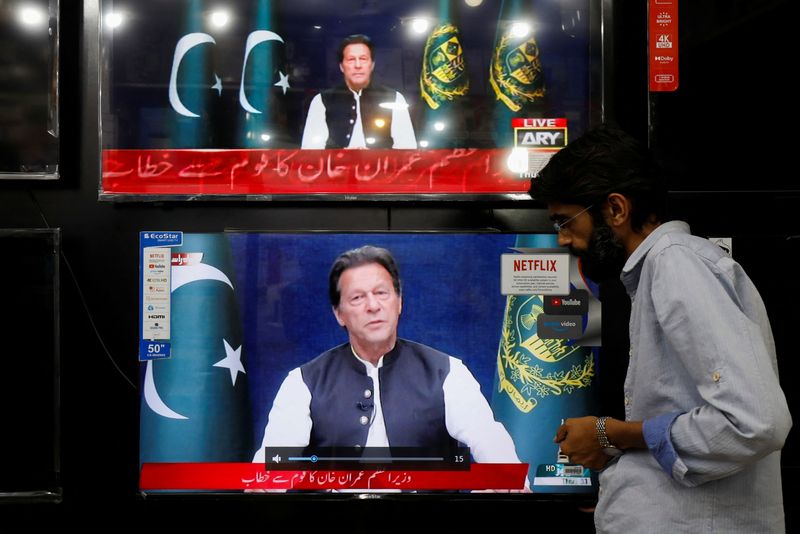ISLAMABAD, (Reuters) – Pakistan’s political turmoil deepened today, when Prime Minister Imran Khan avoided an attempt to oust him and sought fresh elections, a move the opposition challenged as treasonous and vowed to fight.
The deputy speaker of parliament, a member of Khan’s party, blocked an opposition no-confidence motion that Khan had widely been expected to lose.
But the reprieve set up a potential constitutional battle, increasing the uncertainty in the nuclear-armed country of 220 million people.
President Arif Alvi, also of Khan’s party, approved his request to dissolve parliament and Khan called on the nation to prepare for fresh elections.
But Bilawal Bhutto Zardari, head of the opposition Pakistan People’s Party, promised a sit-in at the parliament and told reporters, “We are also moving to the Supreme Court today.”
Opposition leader Shehbaz Sharif, the front-runner to replace Khan if he were removed, called the parliamentary block “nothing short of high treason”.
“There will be consequences for blatant & brazen violation of the Constitution,” Sharif said on Twitter, saying he hoped the Supreme Court would play a role to uphold the Constitution.
The opposition blames Khan for failing to revive the economy and crack down on corruption. He has said, without citing evidence, that the move to oust him was orchestrated by the United States, a claim Washington denies.
The opposition and analysts say Khan, an international cricket champion turned politician who rose to power in 2018 on the powerful military’s support, had fallen out with it, a charge he and the military deny.
“Army has nothing to do with the political process,” Major General Babar Iftikhar, the head of the military’s public relations wing, told Reuters in response to a question about the institution’s involvement in today’s developments.
The Supreme Court is aware of today’s political developments, the chief justice’s office said.
The chief justice “has taken notice of current situation. Further details will be shared soon,” a statement from his office said.
No prime minister has finished a full five-year term since Pakistan’s independence from Britain in 1947, and generals on several occasions have ruled the country, which is perennially at odds with fellow nuclear-armed neighbour India.
BULLET DODGED FOR NOW
State Minister for Information Farrukh Habib said fresh elections would be held in 90 days, although that decision rests with the president and the election commission.
Khan’s cabinet was dissolved but he will remain prime minister, said Information Minister Fawad Chaudhry said in a tweet.
Deputy Attorney General Raja Khalid, a top prosecutor, resigned, calling the government’s parliamentary move unconstitutional. “What has happened can only be expected in the rule of a dictator,” he told local media.
Pakistan’s potential fresh instability comes as it faces high inflation, dwindling foreign reserves and widening increasing deficits. The country is in the middle of a tough International Monetary Fund bailout programme.
In addition to economic crisis, Islamabad faces challenges including an attempt to balance global pressure to prod the Taliban in neighbouring Afghanistan to meet human rights commitments while trying to limit instability there.
Khan lost his majority in parliament after allies quit his coalition government and he suffered a spate of defections within his Pakistan Tehreek-e-Insaf party.
With coalition partners and some of his own lawmakers defecting earlier in the week, Khan had looked set to fall below the 172 votes needed to survive the no-confidence vote if the opposition had remained united.
A prominent newspaper had recently said Khan was “as good as gone”, but he had urged his supporters to take to the streets today ahead of the planned vote.
Instead, legislators from Khan’s party shouted, “A friend of America is a traitor” to Pakistan, as they gathered before the speaker’s dais. Deputy Speaker Qasim Suri announced the no-confidence motion was against the constitution.
Opposition benches, appearing shocked by the unexpected move, mostly remained seated.
On the streets of the capital Islamabad, there was a heavy police and paramilitary presence, with shipping containers used to block off roads, according to a Reuters witness.
Police were seen detaining three supporters of Khan’s ruling Pakistan Tehreek-e-Insaf party outside parliament, but the streets were otherwise calm.






